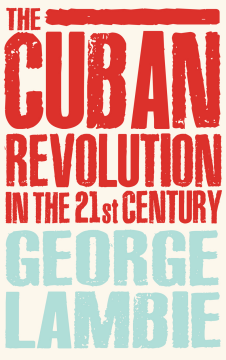
Additional Information
Book Details
Abstract
Politics in Cuba have long been analysed as a 'socialist experiment', from the perspective of internal dynamics or international relations, but what if the revolutionary process is part of a counter-current against neoliberal globalisation?
Rather than presenting Cuba as a socialist survivor, whose performance must be measured against the standards set by the 'international community', George Lambie judges Cuban socialism on the goals that the revolution sets for itself. He shows that despite Cuba's isolation in the 'New World Order', and the enormous pressures it has faced to 'conform', its faith in an alternative socialist project has continued and grown.
After the 2008 financial crash, we have seen neoliberalism's fallibility first-hand, conversely Cuba's promotion of socialist values has a renewed relevance. Lambie argues that Cuba is again becoming a symbol, and practical example, of socialism in action.
'How the Cuban revolution survived the fall of Communism is a question that continues to challenge social scientists across the globe. Lambie goes beyond the specifics of the island and its internal situation, and posits the question in the context of the wider world. His analysis is unique and essential not just for students of Cuba, but anyone wishing to understand the global order and the roots of the current crisis'
Dr Stephen Wilkinson, Director Centre for Caribbean and Latin American Research and Consultancy, London Metropolitan University
'The Cuban revolution continues to divide and confuse in Latin America as elsewhere, not least because it is set against absolute measures of what a 'true' socialist country should look like. George Lambie instead assesses Cuba at a key point in its history from the point of view of its own standards and objectives. A must read'
Professor Ronaldo Munck, City University of Dublin and author of Contemporary Latin America (2008)
'A refreshing study on one of the most significant attempts of our age to chart an alternative course of development'
Professor William I. Robinson, University of California, author of Latin America and Global Capitalism (2008)
'A significant contribution to debates over the future of Cuban socialism. Highly Recommended'
CHOICE
Table of Contents
| Section Title | Page | Action | Price |
|---|---|---|---|
| Cover | Cover | ||
| Contents | vii | ||
| Acknowledgements | ix | ||
| Introduction | 1 | ||
| 1. Globalisation: Understanding the Rationale for an Alternative | 13 | ||
| The Background to Globalisation: from Capitalism ‘Controlled’ to Capitalism Unleashed | 14 | ||
| The Breakdown of Keynesianism and the Rise of Neo-Liberalism | 22 | ||
| The Global Era | 29 | ||
| Summary and the Cuban Context | 56 | ||
| 2. Western Liberal Democracy: Definitions, Ideology and Alternatives | 60 | ||
| Democracy: the Cuban Context | 63 | ||
| The Historical Roots of Democracy | 68 | ||
| The Ideologies of Democracy | 102 | ||
| 3. The Cuban Revolution: Building a Participatory Democratic Process | 119 | ||
| Background to the Insurrection and the Beginnings of the Revolution | 119 | ||
| Revolutionaries and Communists | 127 | ||
| Crossing the Cold War Divide | 135 | ||
| Charting a Separate Socialist Path | 142 | ||
| Experiments in Participatory Democracy | 152 | ||
| From Idealism to Socialist Orthodoxy | 157 | ||
| People’s Power? | 159 | ||
| 4. The Revolution in Crisis | 170 | ||
| The Collapse of the Soviet Bloc: a Lone Struggle in a Hostile World | 170 | ||
| Maintaining Socialism and Participation in the Midst of Capitalist Encroachment | 178 | ||
| Cuba’s Revolutionary Malaise: Seeking Solutions | 192 | ||
| 5. Defending Cuban Socialism Against Global Capitalism: Internal Dynamics and External Opportunities | 206 | ||
| Fidel Castro Retires: the End of an Era? | 207 | ||
| Integrating the Ideals of the Revolution with a Wider Counter-Hegemonic Process | 216 | ||
| Cuba: the Options | 245 | ||
| Conclusion | 251 | ||
| Bibliography | 258 | ||
| Index | 283 |
